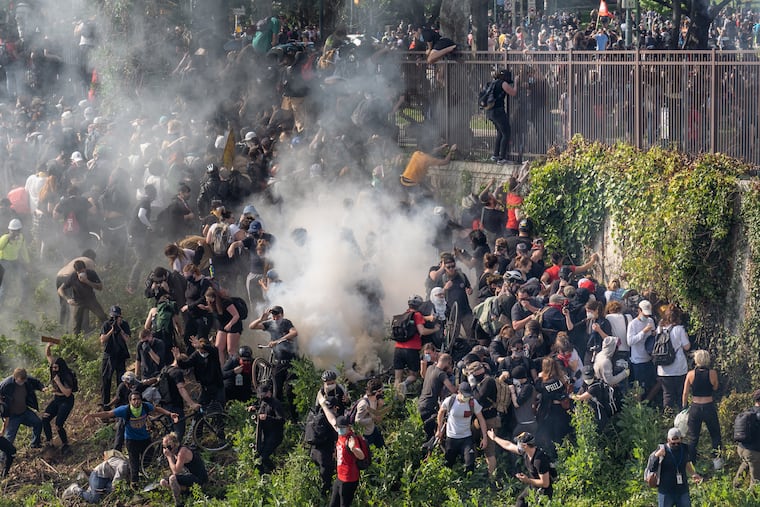Independent review of Philly’s response to protests is best bet to answer questions | Editorial
City Controller Rebecca Rhynhart's independent review of what went wrong during the city's response to several days of civil unrest in May and early June will include voices from the affected communities across Philadelphia.

City Controller Rebecca Rhynhart’s review of Philly’s calamitous response to several days of protests and civil unrest sparked by the police killing of George Floyd has barely begun. But the controller’s announcement this week that a “Community Advisory Accountability Council” will participate in the process is a promising start. The savvy choice of Rev. Mark Tyler, who pastors the Mother Bethel A.M.E. Church, and Jeff Brown, the owner of two city supermarkets, to co-chair the council also sends a clear signal. Communities profoundly impacted by City Hall’s mistakes will get a chance to help figure out what happened and what solutions are needed.
Rhynhart announced the review, to be undertaken by the law firm Ballard Spahr and the AT-RISK International consulting company, on June 4. Five days later, Mayor Jim Kenney issued a statement that promised policing and policy reforms of the sort that have been promised for generations. And on June 15, the mayor and police Commissioner Danielle Outlaw announced the city would launch an “independent after-action investigation’ — of itself.
The Kenney administration says it has hired outside experts to perform the actual work. But how “independent” can a consultant paid by the administration to investigate the administration be? Will the process of this “independent after-action investigation” be off-limits to public participation and scrutiny? And finally, getting answers to the pressing questions of how the city failed to plan and why police acted so aggressively shouldn’t require an investigation; it just requires the administration to be transparent about what it already knows.
» READ MORE: ‘Sir, it’s chaos!’ Critical mistakes doomed the police response to Philly’s George Floyd demonstrations.
The controller’s office has the statutory independence, the wherewithal, and the will to conduct an impartial review of the Kenney administration’s decisions and actions. As the Inquirer reported, despite widespread rage over Floyd’s brutal death at the hands of a Minneapolis cop, a Philly police plan to scale up resources and deploy the sort of peacekeeping response that served the city well during previous mass demonstrations was mysteriously shelved.
So on Saturday, May 30 in Center City, too-few officers were deployed or available as peaceful demonstrations turned violent around City Hall. Witnesses said they spotted few police in the shopping areas east and west of Broad Street as looting erupted and continued for hours. The following day, as looters struck 52nd Street, police fired teargas, pepper spray, and rubber bullets at neighborhood residents, bystanders as well as protesters. Monday, June 1 brought the debacle to I-676, when cops wantonly teargassed demonstrators who had been herded onto an embankment. Three federal lawsuits have been filed against the police for those actions.
» READ MORE: Philly Police Commissioner Danielle Outlaw, Mayor Jim Kenney apologize for teargassing of protesters on 676
If the end result is to have more enduring impact than whatever emerges from the Kenney administration’s self-examination, the community advisory accountability council will be key. The controller’s office is accepting applications through Aug. 9 and will unveil the full membership of the council on Aug. 19. Recommendations are expected before the end of the year, as are results from the administration’s investigation.
If the controller’s report is truly informed and shaped by community leaders, business people, and residents, it’s the one we’re betting on for raising the questions needed to bring long-overdue reforms to Philadelphia policing.